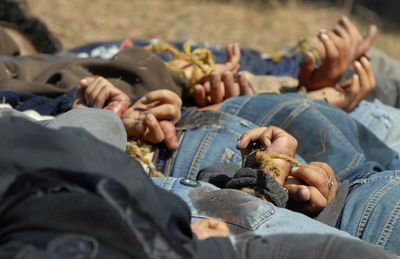Mexico reopens debate over death penalty
Soaring crime has many angry, afraid

MEXICO CITY – Anger and frustration over rampant murders and kidnappings have ignited an improbable debate here over legalizing the death penalty, a punishment that has been effectively banned in Mexico for nearly a half-century.
Lawmakers agreed Thursday to hear arguments next week on a proposal to amend the Mexican constitution to allow for capital punishment in a narrow number of cases.
The initiative from Gov. Humberto Moreira of the northern border state of Coahuila would allow the death penalty for convicted kidnappers who kill or mutilate their victims. As far as the people of his state were concerned, he said, the only issue is how to execute convicts, not whether to do so.
It is highly unlikely, if not impossible, that the death penalty would be reinstated because of legal obstacles, experts say. But that is almost beside the point. Moreira has tapped into public panic over soaring crime that has created a climate of fear and made law-and-order the country’s top worry.
Much of the bloodshed is related to Mexico’s ongoing drug war, as government forces crack down on powerful traffickers, and the traffickers battle among themselves over the lucrative trade.
But violence is also spilling over into ordinary society. Two recent kidnappings of the children of affluent Mexicans – one turned up dead and the other has never been found – underlined the public’s vulnerability. As much as the crimes themselves, it is the fact that there are few prosecutions – impunity and no justice – that riles Mexican society.
“If 98 percent of criminals escape prosecution for their crimes, it is clear that the population feels wounded and tends to support capital punishment,” said Gerardo Priego, a legislator from the ruling National Action Party.
Moreira’s initiative received quick support from several other state governors from his Institutional Revolutionary Party, which ruled Mexico through much of the 20th century.
Critics, however, accused Moreira of taking advantage of the public mood for political gain.
Mexico City’s Human Rights Commission said a return to state-administered executions would set the country back 200 years.
“Behind this call (for the death penalty) is society’s desperation over the climate of insecurity we are living in,” said Alberto Herrera, head of the Mexico chapter of Amnesty International. “But the risk is it leads to calls for revenge. Times of desperation are the worst times to go for facile solutions.”
Reinstating the death penalty is unlikely for legal and political reasons. The last execution in Mexico was in 1961 – coincidentally, in Coahuila. Capital punishment remained on the books but primarily within the military judicial system and unused until 2005, when it was abolished.
In 1981, Mexico signed a human-rights treaty as part of the Organization of American States that dictates that the death penalty, once eliminated, cannot be reinstated.
Furthermore, the PAN, which holds sway in parliament, says it opposes changing the constitution to allow capital punishment, even though some members, like Priego, favor debate.
Recent public-opinion polls showed support for the death penalty surging to as much as two-thirds of the surveyed population.